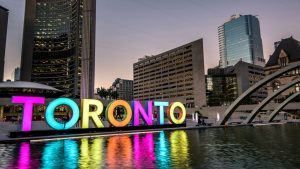The City of Toronto has embarked on a quest to develop standards that would set greenhouse gas (GHG) emissions performance targets for existing aging buildings in the municipality.
The Building Emissions Performance Standards (BEPS) would also provide policies, programs, resources and incentives that encourage building owners to decarbonize the structures.
Staff have been directed to undertake a comprehensive, targeted public engagement process and bring an implementation plan to city council in the third quarter of 2025 that will outline mandatory targets, building types and sizes to be covered, and a timeline for deployment.
Their report will include details on complementary support policies, programs and resources and consider and respond to the social and economic conditions that building owners and occupants are currently facing.
Sharon Bider, co-chair of ClimateFast, a civic movement that aims to get politicians to take decisive and urgent action on the climate crisis, said in a letter to the infrastructure and environment committee that the group supports the standards as buildings are the largest source of GHG emissions.
“At this time, temperature rise is happening so quickly around the world that scientists are very alarmed,” she wrote. “Climate models show that a 2 C rise will trigger tipping points that will make it impossible to have a stable climate. We are going to feel this in our city with extreme weather, heat saves, smoke from forest fires, and flooding.
“Now is the moment for the city to take urgent action to reduce fossil fuel reliance.”
However, the Toronto Industry Network (TIN), an association of manufacturers and industry professionals in the city, objects to the plan because its members were not consulted, and reporting requirements will raise costs.
TIN president Craig McLuckie sent a letter noting members have “serious concerns” with the initiative. In it, TIN requests staff be directed to consult with the group regarding the proposed reporting requirements and bylaw mandating that water, electricity and natural gas use for buildings be reported.
“Our members are being required to report even before consultations are over for a proposed bylaw which may suggest that the consultations are not meaningful. Normally, TIN is engaged at the conceptual stage of such an initiative.”
McLuckie also argued that city hall staff have no idea how difficult it is to separate out water, electricity and natural gas usage for buildings from that used in production. He also warned the data manufacturers and industry members would be required is often proprietary information.
McLuckie suggested the city “would be well-advised to ask the federal and provincial governments why most manufacturing is exempted from similar reporting requirements.”
He said comparing what Toronto plans to do with an emissions performance standards bylaw to what other jurisdictions are doing does not provide a fair comparison as most exempt manufacturing.
And, his letter added, “reporting by the manufacturing sector will raise the costs of many products used every day in our city.”
A report to city council by James Nowlan, executive director of the city’s environment and climate division, stated the need to reduce GHG emissions in Toronto’s building stock and mitigate climate change has never been greater.
“Toronto is experiencing weather that is hotter, wetter, and more extreme and these conditions are expected to worsen. At the same time, Toronto is in the midst of a housing crisis resulting in a lack of affordable and adequate housing options, rising rental costs, inflation and an increased cost of living.”
The building sector is the primary source of GHG emissions in Toronto, contributing 56 per cent of the city-wide total, mainly from the use of fossil fuels like natural gas for space and water heating.
In fall 2019, Toronto declared a climate emergency and in 2021 endorsed the Net Zero Existing Buildings Strategy that identified BEPS as the best way to decarbonize the building stock.
BEPS regulations have been adopted by other jurisdictions in North America and around the world.
The aim of implementing BEPS is to advance the decarbonization of Toronto’s building sector as a critical step towards the city’s community-wide GHG emissions target of net zero by 2040.
To develop the standards, the environment and climate division will analyze baseline emissions performance for specific building types and sizes, set GHG emissions targets for different building typologies and sizes, establish the compliance timelines and non-compliance penalties.
Staff will be consulting and engaging with impacted groups, such as other levels of government, utilities, the building sector, property owners and building managers and residents.
Feedback will be gathered from discussions, an online survey, public town halls and other engagement methods such as residents’ reference panels and possibly Indigenous talking circles.
Ultimately, staff will come up with a draft proposed BEPS bylaw, along with an analysis of the financial impacts for the city and recommended next steps for Toronto council.






Recent Comments